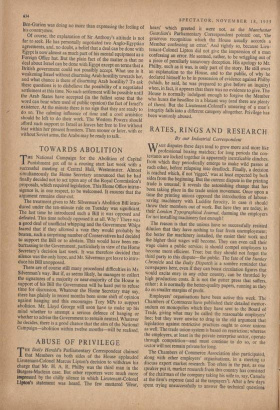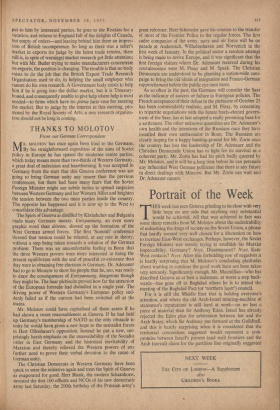RATES RINGS AND RESEARCH
By our Industrial Correspondent WAGE disputes these days tend to grow more and more like professional boxing matches; for long periods the con- testants are locked together in apparently inextricable clinches, from which they periodically emerge to make wild passes at each other, before relapsing into deadlock. Finally, a decision is reached which, if not 'rigged,' was at least expected by both sides from the beginning. But the current dispute in the printing trade is unusual; it reveals the astonishing change that has been taking place in the trade union movement. Once upon a time the printing unions opposed the introduction of labour- saving machinery with Luddite ferocity, in case it should throw their members out of work. But here they are today, in their London Typographical Journal, damning the employers for not installing machinery fast enough !
The reason is that the unions have so successfully resisted dilution that they have nothing to fear from unemployment: the better the machinery installed, the easier their work and the higher their wages will become. They can even call their wage claim a public service; it should compel employers to become more efficient. True; but they should not forget the third party to this dispute—the public. The fate of the Sunday Chronicle and the Daily Dispatch is a sombre reminder that newspapers here, even if they can boast circulation figures that would excite envy in any other country, can be throttled by high production costs. It is not the gutter press that suffers, either: it is normally the better-quality papers, running as they do on smaller margins of profit.
Employers' organisations have been active this week. The Chambers of Commerce have published their detailed memor- andum on monopolies which they have sent to the Board of Trade, giving what may be called the reasonable employers' line; but they were unwise to drag in the old argument that legislation against restrictive practices ought to cover unions as well. The trade union system is based on restriction; whereas the employers, at least in the private enterprise sector, operate through competition—and must continue to do so, or the sector will not remain private for long.
The Chambers of Commerce Association also participated, along with other employers' organisations, in a meeting to discuss export market research. Too often in the past, as one speaker put it, market research from this country has consisted of the chairman of the company taking his wife to, say. Canada at the firm's expense (and at the taxpayers'). After a few days spent trying unsuccessfully to answer fne technical questions put to him by interested parties, he goes to the Rockies for a vacation, and returns to England full of the delights of Canada, but empty of orders—and leaving behind him there an impres- sion of British incompetence. So long as there was a seller's market in exports (to judge by the latest trade returns, there still is, in spite of warnings) market research got little attention; but with Mr. Butler trying to make manufacturers concentrate on exports, the position is changing. The trouble is that no body exists to do the job that the British Export Trade Research Organisation used to do, in helping the small employer who cannot do his own research. A Government body exists to help him if he is going into the dollar market, but it is Treasury- bound, and consequently unable to give help where help is most needed—to firms which have no prima fade case for entering the market. But to judge by the interest in this meeting, pro- moted by the Royal Society of Arts, a new research organisa- tion should not be long in coming.











































































 Previous page
Previous page